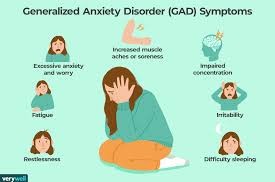Understanding and Easing Generalized Anxiety: A Simple Guide for Everyday Life


What Is Generalized Anxiety and Why Does It Happen?
Do you often feel worried, restless, or tense even when there is no clear reason? You might be dealing with something called generalized anxiety. This is a common condition that affects people of all ages. It happens when your mind gets stuck in a pattern of constant fear and worry, making it hard to relax or feel calm.
People with generalized anxiety often:
- Worry about everyday things like work, family, or health
- Feel nervous or on edge most of the time
- Have trouble sleeping or focusing
- Feel tired easily even after resting
- Get headaches or stomach discomfort from stress
These symptoms can make life difficult and tiring. They affect how you think, feel, and act. But the good news is that there are ways to manage anxiety and feel better again.
The Emotional Side of Living with Anxiety
Living with generalized anxiety can feel like carrying a heavy weight you can’t put down. Even if things are going well in your life, your brain may keep finding new reasons to worry.
You may notice:
- Feeling nervous even in safe situations
- Avoiding social events or responsibilities due to fear
- Doubting your decisions or second-guessing everything
- A constant feeling that “something bad” might happen
This emotional stress can lead to sadness or even depression. When anxiety becomes part of daily life, it’s hard to enjoy the things that used to bring happiness. Understanding this emotional struggle is the first step toward healing.
How Generalized Anxiety Affects the Body
Anxiety doesn’t just live in the mind — it also affects the body. Many people don’t realize that their physical symptoms are connected to their worries and fears.
Common physical signs include:
- Muscle tension or body aches
- Upset stomach or nausea
- Fast heartbeat or chest pressure
- Dizziness or feeling shaky
- Difficulty sleeping or staying asleep
These signs are the body’s way of responding to constant stress. Your body stays alert even when there’s no real danger, and over time, this leads to exhaustion and discomfort.
Everyday Triggers That Make Anxiety Worse
Generalized anxiety can be triggered by things that seem small to others but feel overwhelming to someone living with anxiety.
Some common triggers are:
- Financial pressure or job stress
- Relationship problems or fear of rejection
- Negative thinking patterns or past trauma
- Too much caffeine, poor sleep, or lack of routine
Even watching the news or scrolling through social media can trigger anxiety.That’s why it's helpful to know what affects you personally and take steps to limit those triggers when possible.
Healthy Habits That Can Calm the Mind
While there is no quick fix for generalized anxiety, building good habits can make a big difference. These daily changes help the mind feel more balanced and less reactive.
Try the following:
- Practice deep breathing or mindfulness each day
- Exercise regularly, even short walks help
- Eat balanced meals and avoid too much caffeine or sugar
- Create a sleep routine to improve rest
- Talk to a supportive friend, family member, or therapist
Simple steps like these can calm your nervous system and give you more control over your thoughts and emotions.
How Remeron (Mirtazapine) Can Help with Anxiety
In some cases, lifestyle changes alone may not be enough. That’s when a doctor may suggest medication like Remeron (Mirtazapine) to provide extra support. This medicine works by helping to balance chemicals in the brain that affect stress and mood. It’s especially useful for people who deal with both anxiety and trouble sleeping, offering a calming effect without making them feel numb or detached.
Some key benefits of Remeron include:
- Helping you fall asleep and stay asleep through the night
- Calming racing thoughts and reducing tension
- Improving mood and emotional balance
- Making it easier to enjoy daily activities again
What to Expect When Using Remeron (Mirtazapine)
Remeron is usually taken once a day, often in the evening. Many people begin to feel better within a few weeks, though it works best when combined with healthy habits and emotional support. Unlike some other anxiety medications, Remeron is not addictive, and its side effects are usually mild and temporary.
When starting Remeron, some people may notice:
- Feeling sleepy or drowsy, especially in the beginning
- Increased appetite or changes in weight
- A more stable and relaxed emotional state
- Better ability to cope with daily stress
It’s important to talk to a healthcare provider before starting any medication. With the right guidance, Remeron can become a helpful tool on the journey to a calmer, healthier life.
Managing generalized anxiety takes time, support, and patience. From understanding your triggers and building better habits to using trusted medications like Remeron, there are many ways to regain peace of mind. You are not alone, and with the right tools, you can take steady steps toward feeling better each day.
Article Post:Editorial Team of RXShop.md
(Updated at Jul 2 / 2025)
